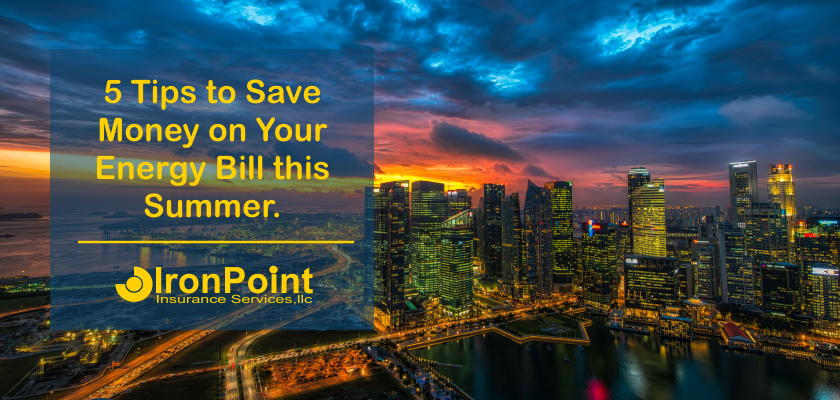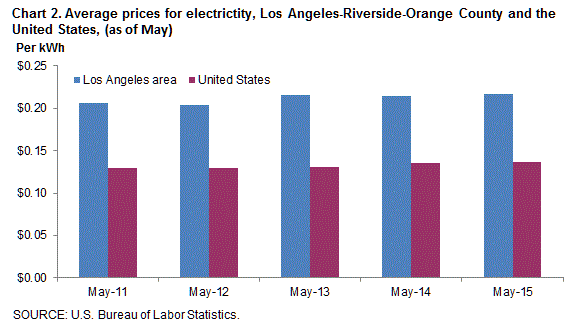5 Tips to Keep Your Air Conditioning Expense Under Control in the Summer Heat

Normally we talk about ways to save money on California home insurance … without compromising coverage of course. But for many of us, our energy costs have been on the rise much faster than our home insurance premiums.
According to the Bureau of Labor Statistics, Californians pay much more for energy than the balance of the United States, with Southern California paying the burnt of the bill. If you live in Los Angeles, Orange County or Riverside, you likely pay 37.6% more than the national average for a gallon of gas, and for electricity, you’ll pay 51.8% more than the national average.

If you hope to manage your electricity bill, there is another issue facing Californians. It’s getting hotter. When it gets hotter we turn down the air conditioning. But this is only going to make it even harder for the average California resident to keep their energy costs controlled. According to the Los Angeles Times, at the end of last year we recorded the hottest year in California since temperature statistics began to be recorded.
In fact, over time we are seeing the average temperature continue to rise. It looks like mother nature isn’t going to provide any relief to our to our energy expenses, especially our air conditioning expense.
The reality is that you’re going to use your air conditioning over the hot summer months. In fact, according to the U.S. Department of Energy, two-thirds of American households have air conditioners — and they’ll be used to the tune of $11 billion in energy costs each year.
That’s a lot of money.
As your insurance agents, we do our part trying to save you money on your home insurance, but I bet you wouldn’t mind spending just a little less to cool you homes this summer as well.
So how can we control air conditioning expense during the summer?
You gotta escape the heat, so if you can do it with a little more cash in your pocket that would be a good thing. Here are five (5) helpful tips to control air conditioning expense during the summer season:
- Ventilate, ventilate, ventilate.The Department of Energy says that ventilation is the least expensive and most energy-efficient way to cool your home. One of the best ways to do this is to open windows to create a cross-wise breeze indoors. It’s best to do this in the mornings or evenings when the air is coolest. After all, flooding your home with hot afternoon air isn’t going to appease anyone.
- Get those fans going.Ceiling fans can provide enough cooling power for you to raise the thermostat a few degrees without noticing the difference. Smaller ones can help as well, but make sure you turn fans off when you’re not around — they cool people, not rooms. Finally, whole-house fans, which bring in air and exhaust it through the attic, can help cool things down even on the hottest days. They should be installed by a professional, though.
- Don’t unwittingly turn the ‘heat’ on.Are you making something in your oven? Cooking something on the stove? You’re also adding heat to your house. Even clothes dryers and dishwashers can create unwanted warmth, so use those appliances in the morning or evening. When it’s time to cook, try grilling outside — or eating more cold foods. They can help lower your internal body temperature.
- Remember the little things — they add up.Keep your curtains closed on the sunny side of your home. Turn off lights whenever you can, because they produce heat. And, if it’s warmer outside than inside, keep your windows closed.
- Bigger projects can have big benefits, too.Make sure your attic and walls are insulated well, with cracks and openings sealed so warm air doesn’t leak into your home. Check your ducts, too. Air loss through ducts can account for as much as 30 percent of a cooling system’s energy consumption, according to the Department of Energy. And, if you don’t already have a programmable thermostat, installing and setting one can help you save up to 10 percent on heating and cooling costs, says the Department of Energy.
If you’re already following all of these tips and you’re still too hot, here are a couple more options: Put on a cool, damp shirt or apply a cold pack (a sandwich bag of ice cubes or a bag of frozen vegetables inside a towel work well) to your forehead and wrists. These last few things do seem a little bit crazy, almost like a scene out of a bad movie, but it really helps if your steadfast in your determination to not run the air conditioning this summer.
Conclusion
Sometimes you just can’t beat the heat, and you simply have to turn the air conditioning back on … we won’t judge you. If you’re going to run your air conditioner this summer season, make sure to have it serviced, replace the filters, and have it running as efficiently as possible … every little bit will help. If you have an older home, you may want to consider upgrading your air conditioning unit, older units can be very costly to run. A new unit may be expensive, but if you live in a warm climate where you find that you run the air early all year, and upgrade can pay for itself fairly quickly.
Switching to high-efficiency air conditioners and taking other actions to keep your home cool could reduce energy use for air conditioning by 20% to 50%.
Image Source: Dmitry Sytnik
Let’s Get Started
Select the way you want to start your quote.







